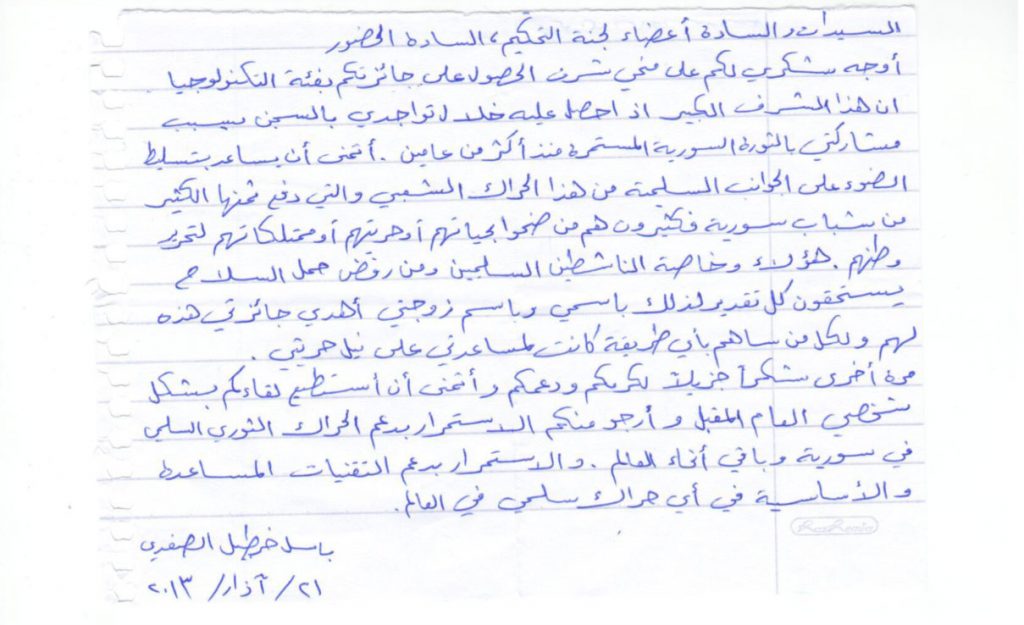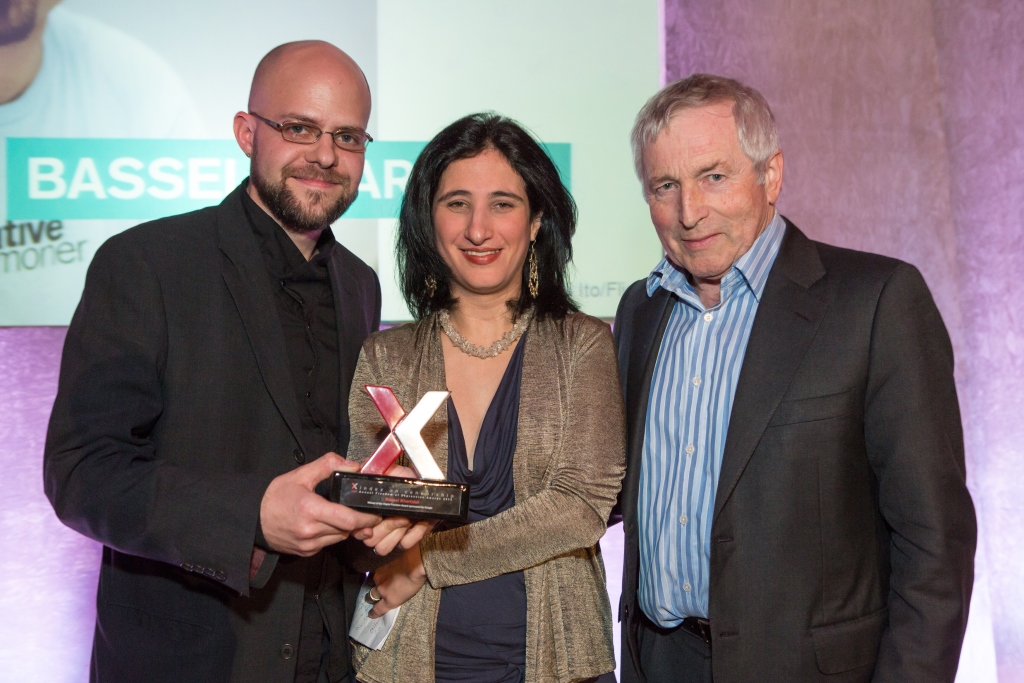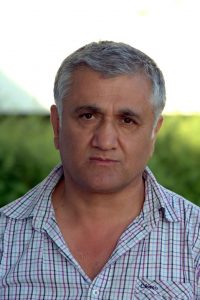11 Aug 2017 | Awards, News and features, Syria
[vc_row][vc_column][vc_row_inner][vc_column_inner width=”1/2″][vc_single_image image=”95161″ img_size=”full” alignment=”center”][/vc_column_inner][vc_column_inner width=”1/2″][vc_video link=”https://youtu.be/GUWv8_bOXgg”][/vc_column_inner][/vc_row_inner][vc_column_text]2013 Freedom of Expression Digital Activism Award-winning Bassel Khartabil, a Syrian-born Palestinian digital activist, worked to build a career in software and web development. Before his arrest in 2012, he used his technical expertise to help advance freedom of speech and access to information in Syria via the internet. His execution by the Syrian government in 2015 was announced by his wife, Noura Ghazi Safadi, on Tuesday 1 August 2017.
The following speech was delivered at the 2013 Freedom of Expression Awards by his friend and colleague Dana Trometer.
Dear Prize Jury Committee Members, Dear Madams and Sirs,
I would like to thank you for this award. I am truly honoured to receive it.
I hope, this great honour, that I receive while I am still in prison for participating in the Syrian Revolution that has been going two years, will shed a light on the nonviolent sides of this popular movement that has claimed the lives of many young Syrian men and women.
Many are those who have lost their possessions, faced imprisonment or sacrificed their souls for freedom in Syria. Those, especially nonviolent activists, who refused to carry arms, deserve all the credit and respect.
Therefore in my name and the name of my wife, I dedicate this award to them, and to all those who are helping me win my freedom back.
I would like to thank you again for your support and for your generosity and I hope I will be able to meet you in person next year, and I urge you to support nonviolent activism and to continue to provide nonviolent movements with the essential technical support in Syria and around the world.
Bassel Khartabil Al Safadi

In prison when he received the 2013 Freedom of Expression Digital Activism Award, Bassel Khartabil wrote his speech to be delivered by a colleague in the UK.

Bassel Khartabil, winner of the 2013 Freedom of Expression Digital Activism Award, was in prison when he won the award. His friends accepted the award on his behalf. From left: Jon Phillips, Dana Trometer and then-chair of Index on Censorship Jonathan Dimbleby.
[/vc_column_text][/vc_column][/vc_row][vc_row][vc_column][vc_basic_grid post_type=”post” max_items=”12″ style=”load-more” items_per_page=”4″ element_width=”6″ grid_id=”vc_gid:1502980043124-10539406-bf4f-4″ taxonomies=”5407″][/vc_column][/vc_row]
10 Aug 2017 | Ireland, Mapping Media Freedom, Media Freedom, News and features
[vc_row][vc_column][vc_single_image image=”95135″ img_size=”full” alignment=”center”][vc_column_text]There’s considerable disagreement about how to tackle Ireland’s lack of plurality of media ownership. At the same time, there’s a growing pessimism that anything will change in the short term.
“There is no doubt we have a high concentration of media ownership in Ireland…that 45 to 50 percent of weekly newspapers – daily titles, plus weekends – are owned by one media organisation is unusual by any standards. Few other democracies exhibit this degree of concentration,” Dr Roderick Flynn, who focuses on media plurality at Dublin City University told Mapping Media Freedom.
Broadcasting in Ireland is dominated by the semi-state body, RTE. Its radio station, RTE Radio One, holds a clear majority of the most-listened-to shows. Its main TV station, RTE One, is equally dominant. The station also has a very significant presence online, and in addition, owns the Irish language station TG4. RTE received a license fee worth €178.9 million in 2015 but, significantly, the company also competes for advertising on all of its media platforms. However, it posted a €20 million loss last year.
In the commercial sector, the businessman Denis O’Brien plays a very significant role in the broadcasting and publishing landscape. He wholly owns Ireland’s largest commercial news radio stations – Newstalk and Today FM – through his Communicorp group. In addition, the company owns music radio stations such as Spin FM. O’Brien is also the largest shareholder in the Independent News and Media group. INM has full ownership of titles such as the Irish Independent, Sunday Independent, Herald, and Sunday World as well as holding a 50% stake in the Irish Daily Star. It also owns regional newspapers such as The Kerryman and The Sligo Champion. O’Brien’s stake in INM stands at 29.9%.
The National Union of Journalists has campaigned for decades for successive governments to legislate to ensure that media ownership in the country does not remain overly concentrated. However, the NUJ has little optimism that things are about to change. Acting general secretary Seamus Dooley summed-up the mood when he told MMF: “Irish politicians have shown cowardice in tackling issues of media ownership, so we would not be confident of reform in this area.”
This situation has had an impact on Ireland’s reputation. A 2017 report from Reporters Without Borders described media ownership in Ireland as “highly concentrated” and asserted that this posed “a major threat to press freedom.” Ireland has fallen from 9th to 14th place in the RWB standings.
A prominent member of the Irish parliament, Catherine Murphy, who is the co-founder of the Social Democrats party, told MMF: “I think the risks are considerable. The media needs to provide the public with a critical analysis on the major issues. When media ownership is concentrated in too few hands, then there is a danger of ‘group-think’ emerging. A practical example would have been the media coverage in advance of Ireland’s property crash.”
Earlier this year, Murphy introduced a private members bill on media ownership, however it was opposed by the coalition government. She is reserving her judgement on indications by the communications minister, Denis Naughten, that the issue will be tackled.
“I think there were some commitments given, and fine words too, but I would want to see the heads of a bill, or a memo going to cabinet, before I would take those commitments and words seriously. There is a laissez-faire approach often adopted by government. I’m afraid that it could all be lip-service”, Murphy said.
During the debate in parliament, Naughten, said: “I believe a strong and pluralistic media is at the heart of a free and open democracy.” However, he then said that the government would be opposing Murphy’s bill, partly on the basis that he believed that “… the current regime to assess media mergers is working well.”
Naughten also asserted that he was precluded by legislation from taking retrospective action because parliament “… has not provided for powers to retrospectively examine, review or intervene in past media mergers.” He argued that this could raise “significant constitutional issues” because it would be required to be balanced with the right to private property.
Ireland’s capacity to examine media mergers was due to be tested this year when Independent News and Media proposed acquiring Celtic Media – a move which would have increased the number of INM’s regional newspaper titles from 13 to 20. Under cross-media ownership regulations, the Broadcasting Authority of Ireland (BAI) was charged with conducting a review, after which the minister for communications would take a decision. However, the €4 million deal was called-off at the last minute – something welcomed by the NUJ which argued that such a merger would have “further undermined media diversity in Ireland.”
Dooley said that the government needs to take a holistic approach, given the plethora of problems facing Irish media – including the flight of advertising to online: “The NUJ has called for a commission on the future of the media in Ireland. This would look at the future of print, broadcasting and digital media. The issue of ownership would form part of the terms of reference. Yes – the industry faces challenges. And the impact of Facebook and Google cannot be understated.”
Other players in the Irish print media include The Irish Times, which is owned and controlled by a trust. Landmark Media controls another national newspaper, The Irish Examiner, as well as a number of regional titles and local radio stations. Landmark is owned by the Crosbie family. The news media giant, News Corp, owns the Irish edition of the Sunday Times, The Irish Sun, and the print-online The Times of Ireland. News Corp also owns several regional radio stations. The Irish Daily Mail is a division of the UK parent company.
The newest broadcasting entrant to the Irish market is the communications giant Liberty Global, which purchased the independent television network TV3. Subsequently, Liberty absorbed the ill-fated station, UTV Ireland, and its financial power has seen TV3 outbid RTE for sports rights.
Given the current situation, the NUJ is very concerned about the capacity of the public to access quality journalism on the major issues of the day. Seamus Dooley told MMF: “Owners seldom directly intervene to influence content. But corporate policies shape news, content and help influence views. So if the emphasis is on maximising profit, at the expense of editorial investment, then that has a significant impact.”
Flynn of DCU has conducted considerable research into this issue. In 2016, he wrote the report Media Pluralism Monitor Ireland and presented the data at a conference in Dublin in 2017 organised by the European Centre for Peace and Media Freedom. He told MMF: “A point that goes slightly under the radar is that as well as owning the two biggest independent radio stations in the country – Newstalk and Today FM – Denis O’Brien’s Communicorp group also owns the Dublin stations 98FM and Spin 103.8. While RTE still accounts for 43% of the County Dublin market as a whole, this drops to 11.2% amongst the 15-24 year olds. By contrast, JNLR listenership figures released in July 2017 suggest that Communicorp-owned stations accounted for more than 52% of the market share in Dublin.”
According to Flynn, the problem is not limited to Dublin. “Newstalk’s so-called ‘rip-and-read’ news service is now used for national and international news bulletins by all regional radio stations in Ireland. That’s another example of the concentration of media ownership here,” he said.[/vc_column_text][/vc_column][/vc_row][vc_row][vc_column][vc_basic_grid post_type=”post” max_items=”12″ style=”load-more” items_per_page=”4″ element_width=”6″ grid_id=”vc_gid:1517486798990-b483150f-f681-9″ taxonomies=”6564″][/vc_column][/vc_row][vc_row][vc_column][vc_column_text]
Mapping Media Freedom
Click on the bubbles to view reports or double-click to zoom in on specific regions. The full site can be accessed at https://mappingmediafreedom.org/[/vc_column_text][/vc_column][/vc_row]
9 Aug 2017 | Campaigns -- Featured, Statements, Turkey, Turkey Statements
[vc_row][vc_column][vc_column_text]

Hamza Yalçın (Photo: Odak magazine)
The arrest of Turkish-Swedish journalist Hamza Yalçın by Spanish authorities is a gross abuse of the Interpol international arrest warrant system and a brazen attempt to stifle press freedom by Turkey’s president, Recep Tayyip Erdogan. Index on Censorship calls on Spanish authorities to allow Yalçın to return to Sweden.
Yalçın was detained at Barcelona’s El Prat airport on 3 August following an international arrest warrant through Interpol initiated by Turkey.
A day later he was arrested by Spanish police on charges of “insulting the Turkish president” and “terror propaganda” related to an article he wrote for Odak magazine. Yalçın was the chief columnist for Odak and the coordinator for its Training and Solidarity Movement. On 18 March, Turkish prosecutors launched an investigation into Doğan Baran, Odak’s managing editor, and Yalçın for his article entitled The Latest Developments in the Military and the Revolutionary Struggle. Both Baran and Yalçın face charges for “insulting the president” and “denigrating the military.”
“This is a clear abuse of the Interpol system because it is a direct violation of Article 2 of its constitution, which requires respect for fundamental rights and freedoms of individuals. It is extremely concerning that an exiled journalist can be arrested for exercising their right to freedom of expression,” said Hannah Machlin, project manager for Mapping Media Freedom, Index on Censorship’s project monitoring press freedom in Turkey and 41 other European area countries.
The Spanish authorities now have 40 days to decide whether to extradite Yalçın back to Turkey.
“Index demands Spain free Hamza Yalçın and allow him to return to his home in Sweden,” Machlin added.
Yalçın was arrested in 1979 on charges of being linked to the People’s Liberation Party-Front of Turkey (THKP-C) Third Way organization. Odak reported that Yalçın was given two consecutive life sentences by the military junta, which was then in control of the Turkish government, for his “revolutionary activities.” He was granted asylum by Sweden and has lived there since 1984.
Odak magazine, which is campaigning for his release, said in a statement that Yalçın “has been made into a target many times for his articles and values.”
The Council of Europe’s parliamentary assembly published Resolution 2161 in April 2017 on the abuse of the Interpol system. The resolution underlined that “in a number of cases in recent years, however, Interpol and its Red Notice system have been abused by some member States in the pursuit of political objectives, in order to repress freedom of expression.” [/vc_column_text][vc_separator][vc_custom_heading text=”Media freedom is under threat worldwide. Journalists are threatened, jailed and even killed simply for doing their job.” font_container=”tag:h3|text_align:left” use_theme_fonts=”yes” link=”url:https%3A%2F%2Fwww.indexoncensorship.org%2Fcampaigns%2Fpress-regulation%2F|||”][vc_row_inner][vc_column_inner width=”1/2″][vc_column_text]Index on Censorship monitors press freedom in Turkey and 41 other European area nations.
As of 9/8/2017, there were 503 verified incidents associated with Turkey in the Mapping Media Freedom database.[/vc_column_text][/vc_column_inner][vc_column_inner width=”1/2″][vc_column_text]Index on Censorship campaigns against laws that stifle journalists’ work. We also publish an award-winning magazine featuring work by and about censored journalists. Support our work today.[/vc_column_text][/vc_column_inner][/vc_row_inner][vc_separator][/vc_column][/vc_row][vc_row][vc_column][vc_basic_grid post_type=”post” max_items=”12″ style=”load-more” items_per_page=”4″ element_width=”6″ grid_id=”vc_gid:1502284900540-fbb3abe9-4651-4″ taxonomies=”55″][/vc_column][/vc_row]



